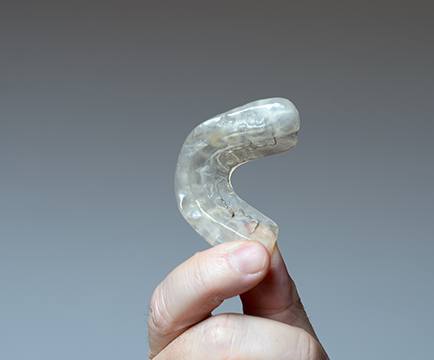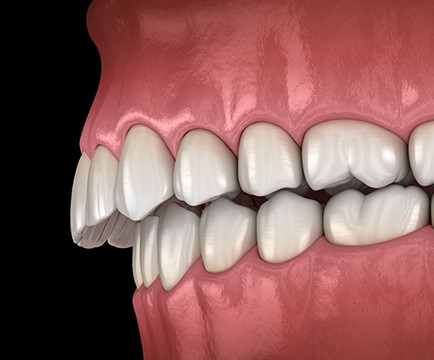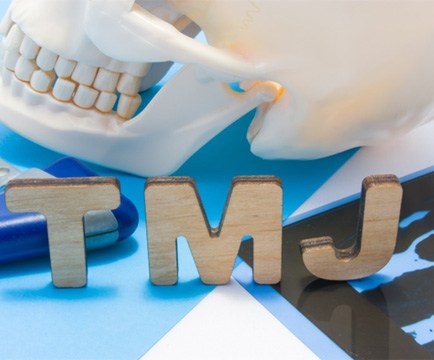Do you experience frequent clicking and popping or lockjaw when you open and close your mouth? These are two common signs that you may suffer from TMJ dysfunction, also known as TMD. This condition can impact your day-to-day life by causing a variety of uncomfortable symptoms and making everyday tasks like chewing food or laughing painful. To learn more about how we stop the constant discomfort of TMJ dysfunction, schedule a consultation with one of our professionals for TMJ therapy in Baltimore.
What Is TMJ/TMD?

Your TMJ, or temporomandibular joint, is the set of small hinges that is located in front of your ears. This joint allows your lower jaw to move freely, giving you the ability to speak, laugh, and eat. The TMJ is one of the most complex joints in the body. Due to a misaligned bite, teeth grinding, and other factors, it is possible to develop tension and chronic pain. This is what’s known as TMJ dysfunction, or TMD.
Signs and Symptoms of TMD

There are numerous symptoms that can occur as a result of TMD, including some that don’t even seem to be related to the jaw. In addition to clicking and popping of the joint when opening the mouth, here are just some of the more common signs of the dysfunction:
Learn More
Headaches and Migraines

One of the most underdiagnosed causes of frequent headaches and migraines is TMD. The jaw muscles become tense, strained, and overworks, so it is easy for this to affect the nearby muscles in the head.
Ear Pain and Tinnitus

Since the TMJ is located so close to the ears, a dysfunctional joint can easily lead to ear pain. TMD can also cause people to develop a constant tone or ringing in the ears, known as tinnitus.
Face and Jaw Pain

Jaw stiffness and pain are the most common symptoms associated with TMD. It can be difficult to chew comfortably, and lockjaw can occur when attempting to open or close the mouth. Pain can range anywhere from a constant, dull ache to flashes of sharp pain.
Bruxism

Bruxism, also known as teeth grinding, can be caused by daily stress, a misaligned bite, and TMD. It primarily occurs during sleep. As a result, the enamel is worn down and the jaw muscles become overworked.
Diagnosing TMD

So many factors can lead to TMD. To diagnose this dysfunction, we will closely examine your joint. This way, we can see exactly how it moves and determine the proper alignment for your teeth and jaw. With this information, we can create a personalized treatment plan to reduce and eliminate the negative symptoms for good.
Treating TMD

The good news is that there are several ways to successfully treat TMD. Depending on the cause of your TMD and the severity of your symptoms, we will put together a plan to help you get some relief. Here are a couple common treatment options:
Occlusal Splints

Occlusal splints are customized orthotic devices that we may suggest helping reduce the prevalence of uncomfortable TMD symptoms. Each mouthguard is individually made for every patient’s unique dental structure and should be worn at night, as you sleep. Once placed in your mouth, it will act to shift your jaw into its ideal position to relieve your joints of additional strain and stress, as well as protect your mouth from the harmful effects of grinding and clenching your teeth.
Occlusal Adjustments

If the underlying problem resulting in TMD pain is due to bite misalignment or an improperly placed restoration, we may suggest occlusal adjustments. During this process, we’ll strategically and gently reshape your teeth, so they come together in a more functional manner that doesn’t cause your jaw joints to strain. To pinpoint the areas of your bite that may be under additional pressure, we’ll take an impression of your teeth and gently buff them down for lasting relief.
TMJ Treatment FAQs

Do you have any questions you want to be answered before you begin your TMJ treatment? Let us know! We’re fully committed to educating our patients and working with them to figure out the best way to stop their jaw pain. The FAQs below cover some of the topics that our patients tend to ask about the most often. Do you have a question that’s not listed here? Call our office and speak to one of our team members!
Learn More
Can TMJ Be Permanently Cured?
The short answer is yes, but it depends on what kind of treatment is used. For example, BOTOX and TENS machine treatments are sometimes performed to help reduce TMJ pain. But while these approaches can help you find temporary relief, they won’t permanently solve the problem. On the other hand, the occlusal splints and occlusal adjustments that our practice offers directly address the root cause of a TMJ disorder, so they tend to provide more lasting results.
How Long Does TMJ Treatment Take?
The answer varies from patient to patient. The cause and severity of your TMJ disorder need to be taken into account; the more complex the problem is, the longer it will take to achieve lasting relief. Also, the type of treatment can affect the timeline as well:
-
Occlusal splint therapy can take anywhere from a few weeks to several months. As long as you’re wearing your oral appliance as directed every night, you should see long-term relief.
-
Occlusal adjustments can usually be completed in just one visit, although it can depend on what kind of changes need to be made. Usually, once your bite and teeth have been properly aligned, it won’t be long before you experience relief.
Does Occlusal Adjustment for TMJ Hurt?
The occlusal adjustment process normally involves removing small amounts of enamel from your teeth. On occasion, we might also apply composite resin to build up your existing dental structures. In either case, we’ll go out of our way to make the treatment as comfortable as possible for you. If necessary, we will numb your mouth with a local anesthetic so that you don’t experience any discomfort while we’re working on your teeth.
Some patients experience soreness for a few days following occlusal adjustment. It should fade on its own over time, and it’s normally mild enough to be easily controlled with over-the-counter medications.
Is TMJ Treatment Covered by Insurance?
The TMJ isn’t specifically related to dentistry because it’s a joint, but some TMJ treatments like occlusal splint therapy are only available from your dentist. As such, TMJ therapy can be covered by medical or dental insurance depending on the situation. Different states and companies have their own standards for how insurance handles TMJ-related treatments, and in many cases, only certain types of services might be covered. You should call your insurance provider directly to ask about what TMJ coverage is available before you agree to any treatments.
 Formerly Conklin & Ward Dental Group
Formerly Conklin & Ward Dental Group






